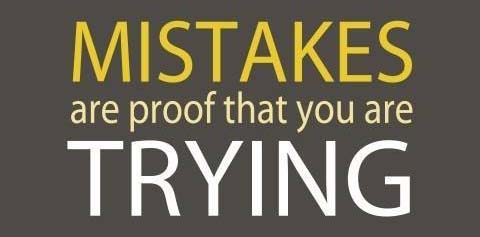Life
10 Hidden Blessings in Rejection, Losing and Failure
Rejection. Losing. Failure.
Nobody strives for them. No athlete sets out for last place, no entrepreneur’s goal is bankruptcy.
But as if an act of divine mercy, there’s positives to be found in the negatives. In fact, it’s almost gospel the extent we hear successful people preaching the value in failing.
Denis Waitley said it well:
“Failure should be our teacher, not our undertaker. Failure is delay, not defeat. It is a temporary detour, not a dead end. Failure is something we can avoid only by saying nothing, doing nothing, and being nothing.”
Successful people lick their wounds but never leave the battlefield, they turn their scars into strengths.
In approaching rejection, losing and failure, here are 10 hidden blessings:
1. You’ll Clarify Your Passions
Many of us struggle with decision making. Those with creative energy typically have their hand in multiple pies. But even a jack-of-all-trades knows there’s a limit to how thin you can spread yourself.
Often, failure and losing result from diminished passion. You realize you weren’t as passionate about that project as first thought. The pruning effect is a positive. As you clear your plate a little, the things that are left are what really gets you excited, and you direct your energy toward them.
Focused energy is when you’re most effective, failure gets rid of fluff.
2. You’ll Uncover New Skills
Remember when George Bush nimbly dodged that shoe destined for his head? Nobody thought he had the skill to do that. And I suspect neither did he. Until that moment.
Facing challenges and enduring a loss causes us to gather up resources and develop skills beyond our arsenal. In cases of “hysterical strength,” where ordinary people lift cars off someone trapped, it’s the negative situation that produces the surge of adrenaline and an act beyond one’s capability.
Negative experiences cause us to respond in ways beyond what we thought possible. The obstacle beckons to be overcome. In order to rise to the occasion, there needs to be an occasion.
3. You’ll Find Out Who Your Friends Are
Take a spill and you’ll see who emerges out of the Facebook crowd to lift you up. Sure, everyone’s busy, but we make time for the things we value and care about. “I’m too busy” can be translated, “It’s not that important.”
Relationships are crucial in life, they take a lot of work and time invested—you don’t want to be investing in bad stock. Of course friendships aren’t to be boiled down to a shallow transaction, but unfortunately, some folks see them that way— a lot of taking without any giving. It’s these relationships that need severing. There’s no honor, or sense, in helping others when you’re hurting yourself.
Hitting rock bottom uncovers the healthy relationships from the detrimental. You’ll want to keep investing in those who are nursing your wounds, and distance yourself from the silent and nowhere to be seen.
4. You’ll Check Your Blind Spots
It only takes one accident for a driver never to forget checking their blind spot again. A harsh way to learn, but some changes in behavior only happen with such shocks to the system.
While there are habits and skills we’ve not yet acquired, failures remind us of the ones we do possess, but simply lazy in doing. After suffering a robbery, you’ll never forget to lock the screen door again.
5. You’ll Burn Away Pride and Arrogance
Nobody is immune to pride and arrogance. To say you’re beyond pride and arrogance is a little… well… prideful and arrogant. Losing is the glass of water for that bitter pill of pride. But that unpleasant process gives birth to humility. Which is perhaps the most attractive and profitable virtue anyone can possess.
As the proverb goes, “Pride goeth before the fall;” rejection and loss exchanges pride for humility, and may be the savior that prevents your fall.

6. You’ll Grow Elephant Skin
The shins of Muay Thai fighters can break baseball bats. The micro-fractures from hours upon hours of kicking heavy bags are filled with calcium, resulting in abnormal bone density. It’s just as muscle fibers grow as a result of micro-tears in the gym.
The old adage rings true—it’s the pain that brings the gain. The healing of a fracture carries a gift. 101-advice for anyone stepping out to pursue their dream is prepare for rejection, criticism and haters. And with each punch thrown your way, you’ll realize that you can’t please everyone, and the impact will start to soften. You’ll even learn to bob and weave, realizing the issue lies more with them than with you.
7. You’ll Never Wonder “What If?” Again
The question of “What if?” can cause hours on end staring out the window. When that curiosity is pursued only to find you’ve boarded the wrong plane, failure is the blessing that pulls you right off. You’ll no longer be kept up at night wondering about that other option.
Curiosity can cripple our consciousness and distracts from the work we should be doing. But sometimes engaging your own nagging is the only way to silence it.
Seeing his father drink beer, a teenage Tony Robbins begged his mother to let him try. Not only did she let him try, she gave him a whole six-pack, and wouldn’t let him leave until he drank every drop. Tony has never touched alcohol since. The taste of his own vomit may have something to do with that.
8. You’ll Finally Ask For Help
Anyone with passion and ambition is tragically plagued with superhero-syndrome, which is both helpful, and harmful; particularly when the candle is burning at both ends, and you’re drifting toward burnout.
When the word “help” disappears from our vocabulary, it’s found when we crash and burn. We realize the skill of delegation is critical for our health and progress. We need to move away from viewing help negatively as a form of weakness, to positively—that our success is growing beyond our own capacity.
9. You’ll Go To The Drawing Board
And you’ll engage in iteration. The process of reevaluating and refining, which produces a better end-result. As the saying goes, “Why fix it if it ain’t broke?” Some things need fixing, but reevaluation doesn’t happen if something doesn’t break.
No doubt one of the greatest human achievements: 110-mile swim from Cuba to Florida without a shark cage. The only individual in the world to accomplish that feat—64-year old Diana Nyad. She was on her fifth attempt, her first attempt back in 1978 and three other attempts from 2011 – 2012.
Her last attempt was cut short with jellyfish stings that left her face puffed and swollen. This time, she wore a full bodysuit, gloves, and a mask at night—when jellyfish rise to the surface.
She failed, went back to the drawing board, made iterations, and succeeded.
10. You’ll Appreciate Your Success
Value and meaning become heightened in the face of difficulty. The greatest celebrations come from the toughest battles. You’ll realize the dream isn’t all rainbows and butterflies.
When the journey includes getting back on your feet and dusting yourself off, you’ll be more inclined to stop when you see roses, and express a little more gratitude and appreciation at the finish line.
Among the 14 “Eight-Thousanders” on earth, few recognize Kangchenjunga—while Everest is a household name. There’s only 262 meters separating the two mountains, but it’s the failures and deaths on Everest that make it the most respected and celebrated climb.
The bitterness of every failure adds sweetness to every victory.
Did You Know
How Skilled Migrants Are Building Successful Careers After Moving Countries
Behind every successful skilled migrant career is a mix of resilience, strategy, and navigating systems built for locals.

Moving to a new country for work is exciting, but it can also be unnerving. Skilled migrants leave behind familiar systems, networks, and support to pursue better job opportunities and a better future for their families. (more…)
Life
10 Research-Backed Steps to Create Real Change This New Year
This New Year could finally be the one where you break old patterns and create real, lasting change.

Every New Year, we make plans and set goals, but often repeat old patterns. (more…)
Life
9 Harsh Truths Every Young Man Must Face to Succeed in the Modern World
Before chasing success, every young man needs to face these 9 brutal realities shaping masculinity in the modern world.

Many young men today quietly battle depression, loneliness, and a sense of confusion about who they’re meant to be.
Some blame the lack of deep friendships or romantic relationships. Others feel lost in a digital world that often labels traditional masculinity as “toxic.”
But the truth is this: becoming a man in the modern age takes more than just surviving. It takes resilience, direction, and a willingness to grow even when no one’s watching.
Success doesn’t arrive by accident or luck. It’s built on discipline, sacrifice, and consistency.
Here are 9 harsh truths every young man should know if he wants to thrive, not just survive, in the digital age.
1. Never Use Your Illness as an Excuse
As Dr. Jordan B. Peterson often says, successful people don’t complain; they act.
Your illness, hardship, or struggle shouldn’t define your limits; it should define your motivation. Rest when you must, but always get back up and keep building your dreams. Motivation doesn’t appear magically. It comes after you take action.
Here are five key lessons I’ve learned from Dr. Peterson:
-
Learn to write clearly; clarity of thought makes you dangerous.
-
Read quality literature in your free time.
-
Nurture a strong relationship with your family.
-
Share your ideas publicly; your voice matters.
-
Become a “monster”, powerful, but disciplined enough to control it.
The best leaders and thinkers are grounded. They welcome criticism, adapt quickly, and keep moving forward no matter what.
2. You Can’t Please Everyone And That’s Okay
You don’t need a crowd of people to feel fulfilled. You need a few friends who genuinely accept you for who you are.
If your circle doesn’t bring out your best, it’s okay to walk away. Solitude can be a powerful teacher. It gives you space to understand what you truly want from life. Remember, successful men aren’t people-pleasers; they’re purpose-driven.
3. You Can Control the Process, Not the Outcome
Especially in creative work, writing, business, or content creation, you control effort, not results.
You might publish two articles a day, but you can’t dictate which one will go viral. Focus on mastery, not metrics. Many great writers toiled for years in obscurity before anyone noticed them. Rejection, criticism, and indifference are all part of the path.
The best creators focus on storytelling, not applause.
4. Rejection Is Never Personal
Rejection doesn’t mean you’re unworthy. It simply means your offer, idea, or timing didn’t align.
Every successful person has faced rejection repeatedly. What separates them is persistence and perspective. They see rejection as feedback, not failure. The faster you learn that truth, the faster you’ll grow.
5. Women Value Comfort and Security
Understanding women requires maturity and empathy.
Through books, lectures, and personal growth, I’ve learned that most women desire a man who is grounded, intelligent, confident, emotionally stable, and consistent. Some want humor, others intellect, but nearly all want to feel safe and supported.
Instead of chasing attention, work on self-improvement. Build competence and confidence, and the rest will follow naturally.
6. There’s No Such Thing as Failure, Only Lessons
A powerful lesson from Neuro-Linguistic Programming: failure only exists when you stop trying.
Every mistake brings data. Every setback builds wisdom. The most successful men aren’t fearless. They’ve simply learned to act despite fear.
Be proud of your scars. They’re proof you were brave enough to try.
7. Public Speaking Is an Art Form
Public speaking is one of the most valuable and underrated skills a man can master.
It’s not about perfection; it’s about connection. The best speakers tell stories, inspire confidence, and make people feel seen. They research deeply, speak honestly, and practice relentlessly.
If you can speak well, you can lead, sell, teach, and inspire. Start small, practice at work, in class, or even in front of a mirror, and watch your confidence skyrocket.
8. Teaching Is Leadership in Disguise
Great teachers are not just knowledgeable. They’re brave, compassionate, and disciplined.
Teaching forces you to articulate what you know, and in doing so, you master it at a deeper level. Whether you’re mentoring a peer, leading a team, or sharing insights online, teaching refines your purpose.
Lifelong learners become lifelong leaders.
9. Study Human Nature to Achieve Your Dreams
One of the toughest lessons to accept: most people are self-interested.
That’s not cynicism, it’s human nature. Understanding this helps you navigate relationships, business, and communication more effectively.
Everyone has a darker side, but successful people learn to channel theirs productively into discipline, creativity, and drive.
Psychology isn’t just theory; it’s a toolkit. Learn how people think, act, and decide, and you’ll know how to lead them, influence them, and even understand yourself better.
Final Thoughts
The digital age offers endless opportunities, but only to those who are willing to take responsibility, confront discomfort, and keep improving.
Becoming a man today means embracing the hard truths most avoid.
Because at the end of the day, success isn’t about luck. It’s about who you become when life tests you the most.
Change Your Mindset
The Four Types of Happiness: Which One Are You Living In?
Most people chase success only to find emptiness, this model reveals why true happiness lies somewhere else.

In a world driven by rapid technological growth and constant competition, many people unknowingly trade joy for achievement. (more…)
-

 News2 weeks ago
News2 weeks agoBrandon Willington Builds 7-Figure Business by Ignoring Almost Everything
-

 Health & Fitness3 weeks ago
Health & Fitness3 weeks agoWhat Minimalism Actually Means for Your Wellness Choices
-

 Did You Know2 weeks ago
Did You Know2 weeks agoWhy Most Online Courses Fail and How to Fix Them
-

 Business2 weeks ago
Business2 weeks agoIf Your Business Internet Keeps Letting You Down, Read This
-

 Business6 days ago
Business6 days agoEntrepreneur’s Guide to Pay Stubs: Why Freelancers and Small Business Owners Need a Smart Generator
-

 Business5 days ago
Business5 days agoThe Simple Security Stack Every Online Business Needs
-

 Scale Your Business4 days ago
Scale Your Business4 days ago5 Real Ways to Grow Your User Base Fast
-

 Business3 days ago
Business3 days agoThe Salary Shift Giving UK Employers An Unexpected Edge



























Pingback: Anonymous